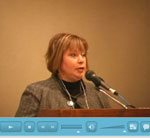Calgary Job Search Strategies Forum Report
Conducting an Effective Job Search
| Video |
 |
Melody Choboter, Mount Royal College
Melody Choboter said the hardest part of looking for employment is getting started, because a job seeker must get through the confusion and the fear of failure.
She suggested that participants ask themselves three questions before starting a job search:
- What kind of job would I like to do?
- What type of industry would I like to work for?
- Where would I like to work?
Choboter said that it is critically important to not only focus on advertised positions or wait until a position becomes advertised. Statistics show that 48% of people find employment through networking, 28% are hired through direct employer contact, and 13% find a job through a combination of the two. Only 8% of job seekers find a position from the classified ads and 3% through employment agencies.
To make the job search easy, Choboter broke it down into seven steps:
- Know your product
- Know your target market
- Create job search materials
- Develop a job search plan
- Take action
- Follow up
- Review your progress
As a first step, Choboter said a job seeker should define a specific career objective and then compile a list of experiences, education, skills, attributes, and activities. “What do you have to offer in exchange for a paycheque?” she asked.
Once the list is compiled, it is important to look at what employers are looking for. “Your job is to be very familiar with what the market requires,” she said. One of the biggest mistakes is not researching what positions are out there and what employers want. It is also important to develop lists of industries, organizations, and contacts through informational interviews, attending networking meetings and events, reading business magazines and journals, researching company websites, and conducting labour market research. Job seekers should also talk to their networks, which can connect them to other people.
After assessing skills and target markets, Choboter said job seekers should compile any materials needed to move forward in the job search. This can include resumés, cover letters, and portfolios of their work. Choboter suggested that job seekers also develop short scripts or brief introductory statements that may be used when calling prospective employers.
Upon completion of these background steps, Choboter recommended that job seekers develop a plan for their job search. This includes mapping out activities that need to be done, listing goals, and setting specific deadlines and follow-up dates. It is important to look at the amount of time that will be devoted to each task and have an idea of what the job search timeline will look like.
Choboter said it is important to be organized. She recommended that job seekers have an area to lay out materials so that the information is easily found, and that they keep track of every employer contacted as well as any feedback that was received. This is also a good plan for those who are looking at long-term job goals.
Once these background steps are taken care of, it is time to move into action. While applying to postings and contacting employers, Choboter said it is important to identify what methods are working and maintain a positive attitude. While places to learn about postings abound, she cautioned that many online ads are not real jobs but are placed by companies who plan to fill them at a later date, or who want to show they are growing.
In the follow-up step, Choboter said job seekers should reconnect with employers by telephone, thank-you letter, or email. Job seekers should always make sure they follow through with any information employers ask them to provide, and should also keep the people in their networks informed as to how the search is going. It is also appropriate to check in after replying to an ad—to confirm materials were received, and to ask for a timeline for potential interviews—and after an interview. A thank-you letter sent out within 48 hours of the interview shows the employers what job seekers will be like on the job in terms of responsiveness and professionalism.
Choboter said the job seeker should review the job search progress. If necessary, they should re-evaluate their materials, the market, research, mentors, networks, and timelines, and adjust when needed.
“Looking for a job can truly be one of the hardest jobs you can ever have,” she concluded, “and the work you put in today can mean success tomorrow.”

 Quick Question:
Quick Question:

